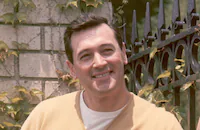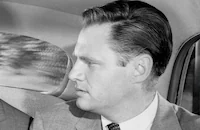The Last Sunset

Brief Synopsis
Cast & Crew
Robert Aldrich
Rock Hudson
Kirk Douglas
Dorothy Malone
Joseph Cotten
Carol Lynley
Film Details
Technical Specs

Synopsis
American lawman Dana Stribling rides into Mexico in search of Brendan O'Malley, wanted for the murder of Dana's brother-in-law. He finds O'Malley working for John Breckenridge, a whisky-sodden cattleman readying his herd for a drive across the border to the Texas town of Crazy Horse. (O'Malley has been trying unsuccessfully to resume an affair he had 16 years before with Breckenridge's wife, Belle.) Dana, unable to serve his warrant in Mexico, signs on as a trail boss, but not before warning O'Malley that a showdown is imminent the minute they cross the border. Shortly after the trek begins, Breckenridge is killed in a barroom brawl. Dana and O'Malley take over the drive and, though still enemies, gradually develop a grudging admiration for each other. As the days pass, Belle and Dana fall in love and O'Malley is pursued by Belle's teenaged daughter, Missy. After some adventures along the way, the company arrives with the herd at the Rio Grande. Before crossing, Belle decides to celebrate. Missy dresses up in one of her mother's gowns, and O'Malley, startled by her resemblance to the Belle of 16 years ago, makes ardent love to her. Belle then confronts him with the knowledge that Missy is his daughter. Shattered by the revelation, O'Malley empties his pistol and permits Dana to kill him in their showdown.

Director

Robert Aldrich
Cast

Rock Hudson

Kirk Douglas

Dorothy Malone

Joseph Cotten

Carol Lynley

Neville Brand

Regis Toomey
Rad Fulton

Adam Williams
Jack Elam
John Shay
Margarito Luna

José Torvay
Crew
Joseph Behm
Tom Connors
Don Cunliffe
Oliver Emert
Eugene Frenke
Larry Germain
Joseph Gershenson
Ernest Gold
Alexander Golitzen
Millard Kaufman
Norma Koch
Ernest Laszlo
Edward Lewis
Michael Luciano
Edward Mann
Nate Slott
Alfred Sweeney
Dimitri Tiomkin
Ned Washington
Waldon O. Watson
Bud Westmore

Photo Collections
Videos
Movie Clip


Trailer
Hosted Intro
Film Details
Technical Specs

Articles
The Last Sunset
While Spartacus (1960) was in post-production, Kirk Douglas and his Bryna Production team went to Mexico to film the offbeat and perverse Western The Last Sunset (1961). Dalton Trumbo was brought on board for the second consecutive Bryna Production. His charge was to adapt Howard Rigsby's book Sundown at Crazy Horse into a fitting follow-up to Trumbo and Douglas' Roman slave revolt epic. To direct the picture, Douglas hired Robert Aldrich. Like Douglas' tumultuous experience working with Stanley Kubrick on Spartacus, their relationship was rocky. At first, Douglas was impressed by Aldrich's enthusiasm, expressed in a letter before Douglas hired him: "I am completely dedicated to the hope that somehow, some way, you will decide that it is in our collective best interests that I direct The Last Sunset...I have to do your picture, and I have to do it better than any picture you have ever made before." But according to Douglas, he soured on Aldrich when the director arrived in Mexico with five writers, all working on other projects.
Douglas himself took the complicated bad guy role, while Universal-International's top box-office star Rock Hudson received top billing as the vanilla good guy. After Lauren Bacall refused the part of Belle, the part went to Dorothy Malone, who much later appeared in Basic Instinct (1992), starring Kirk's son, Michael. Joseph Cotten was hired to play the besotted cattleman, John Breckenridge. In his biography, Vanity Will Get You Somewhere, Cotten was more specific about the character he was playing: "Not only was I the cuckold husband of Dorothy Malone and the father of Carol Lynley (at least I thought I was her father), but I was a traitor, a rat who had deserted his command in the Confederate Army and carried a scar on one buttock eternally to stigmatize the shame. (Aldrich and the producer promised never to release this film in Tidewater as long as my mother drew breath.)" Cotten also commented on the difficulties of shooting a cattle drive on film: "There were literally thousands of them being prodded and driven past the cameras, but their behavior was so completely uninhibited that they could be photographed from no angle whatsoever. Always in this sea of trotting longhorns or shorthorns or no horns, there were several very prominent horny horns humped up on the back of their neighbors, or rather their neighbor's wives." On a personal note, Cotten had a much worse time of it adjusting to the Mexico shoot than the other cast members. According to Kirk Douglas in his autobiography The Ragman's Son, Cotten "was very finicky, brought canned food from America, drank only bottled water. He never touched any food from Mexico. And, of course, he was the first one to become sick. He became violently ill, completely dehydrated. You can take all the precautions in the world and still get the bug."
As far as acting opposite Universal's biggest star at that time, Douglas wrote "I had a problem working with Rock Hudson that I did not understand at the time. He avoided any kind of direct contact with me. I was aware of how difficult it must have been for him - his co-star also the producer, the boss. I tried everything I could to make him feel comfortable. But Rock always had a strange attitude toward me...When I saw him socially, it was all pleasant. But there was never any feeling of friendship - or of animosity. Just this strange distance and neutrality. In Rock, I saw what the rest of the world saw: a tall, dark, husky actor. It never occurred to me that he was homosexual. I don't think that way. I don't draw a line between masculine and feminine. We all have both sides." Douglas's relationship with Aldrich was much more problematic as noted and so were his dealings with Universal. "The Last Sunset is another example of how a studio operates," Douglas stated. "Universal insisted on controlling the production. The publicity department sent over pages and pages of suggestions for titles, most of them atrocious: The Magnificent Two, The Magnificent Brutes...Seething Guns...Thunderblast, Two to Make Hate...Trigger Talk, Death Is My Middle Name..Shoe the Wild Sea-Mare...My Gun, My Life!."
Shot entirely on location in Mexico, production was completed on time July 29, 1960, but due to post-production problems, the film wasn't released until June 8, 1961.
Producer: Eugene Frenke, Edward Lewis
Director: Robert Aldrich
Screenplay: Howard Rigsby (novel), Dalton Trumbo
Cinematography: Ernest Laszlo
Film Editing: Michael Luciano
Art Direction: Alexander Golitzen, Alfred Sweeney
Music: Ernest Gold, Tomas Mendez
Cast: Rock Hudson (Dana Stribling), Kirk Douglas (Brendan O'Malley), Dorothy Malone (Belle Breckenridge), Joseph Cotten (John Breckenridge), Carol Lynley (Missy Breckenridge), Neville Brand (Frank Hobbs).
C-112m. Letterboxed.
by Scott McGee

The Last Sunset
Quotes
Trivia
Notes
The working title of the film was Day of the Gun. According to May and June 1960 Hollywood Reporter news items, portions of The Last Sunset were shot in Aguascalientes, Mexico.

Miscellaneous Notes
Released in United States Summer July 1961
Released in United States Summer July 1961















